Michael Patrick Clark's Blog, page 2
May 2, 2015
Kindle copies free today at Amazon
January 1, 2015
Happy New Year
November 1, 2014
Out today on Kindle
October 31, 2014
Out tomorrow on Kindle
October 2, 2014
September 5, 2014
On those who have amazed and inspired me during my life
Given my frequent comments about not liking ‘the celebrity culture’, you may not be surprised to learn that I have worshipped few heroes in my life.
Which is not to say that I don’t admire and respect those who have genuinely achieved in their lifetimes, merely that it takes a little more to impress me than ferocious ambition, fluke luck, hype, technically-enhanced performances, and cleverly staged and televised auditions.
Nor does it belittle the many actors and actresses, singers, musicians, writers, directors, producers, filmmakers, sports men and women, and artists of all shapes, sizes, branches, disciplines and genres, who have enriched and brought joy to my life.
I love to watch them and listen to them. I love to lose myself in their work. I am happy to shell-out my hard earned shekels, to recompense them for their undoubted talents, but to actually fete and worship them. . ?
I’m sorry, but no.
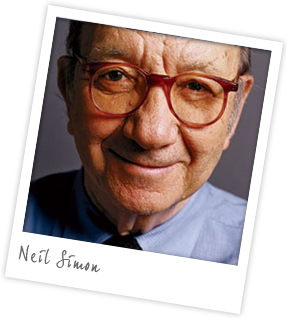
If I may paraphrase Neil Simon, from the multi-award-winning motion picture The Goodbye Girl. . . Great artists and their work are wonderful to watch, admire, and even emulate. It’s only when they climb down from their pedestals, and mingle with the rest of us, that everyone’s life gets screwed up!
Neil Simon was a little more pithy but how true that so often proves.
However, there is a small and elite band of humankind that I do place higher than ordinary mortals, and since I have nothing else going on in my head this week, as with most weeks, I have decided to share that list with you. . . You lucky people!
So, here goes. . . . . . .
My earliest recollection of something more than admiration for another unrelated human being was Sir Winston Churchill.
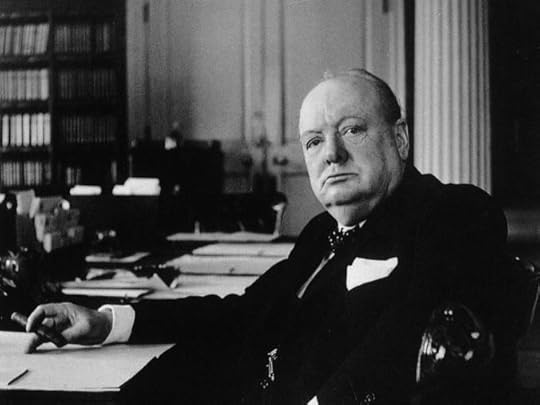
Sir Winston Churchill
I can still recall the fit of melancholy that enveloped me as I stood on a frozen Sunningdale station platform in January of 1965, and watched the great man’s coffin pass by on that final journey to his eternal resting place.
It was about the same time when my immediate future was decided, in the Headmaster’s study that day, and if you have no idea as to what I’m talking about you should read Flying with Cuckoos.
However, far from my recollection of that chastening experience, my recollection of Churchill was a man of boundless charisma, and a life filled with achievement and inspiration.
Since that time I have added four more inspirational figures to my elite club of ‘celebrities’ and all for different reasons.

Audrey Hepburn
Audrey Hepburn was the second ‘celebrity’ to be added to the short list, because she was quite simply the most beautiful movie star of all time; dainty and delicate and impish and stylish and quite, quite beautiful. She has inspired legions of celebrity wannabes, but to my mind there will only ever be one Audrey Hepburn.

Margaret Thatcher
Next came Margaret Thatcher, who was anything but dainty and delicate, and I am sure that many in Britain consider her something akin to the antichrist. I have no intention of getting into political argument, but whatever else people may or may not think about Thatcher, one thing is indisputable.
She picked up the crown of Britain’s democratic process, from where Ted Heath had left it lying in the gutter, in 1974, and restored It to its rightful place. Margaret Thatcher makes my list for that act alone.
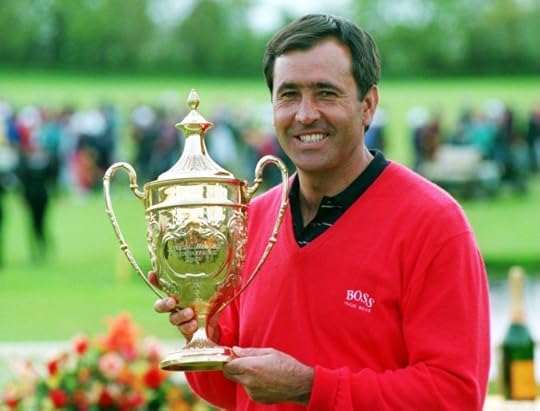
Seve Ballesteros
Then comes Seve Ballesteros, because I love sport, and I love golf, and I love charismatic characters.
Forget about who’s better or worse, or who won this or who won that.
In my golfing lifetime I’ve hit the ball over four-hundred yards, albeit with a following gale-force wind. I’ve had holes-in-one, albatrosses and back-to-back eagles, sunk sixty-foot putts, and returned sub-par rounds. I have seen the best, talked to the best, and occasionally played with the best, but Seve was different. Seve could play shots that were beyond the comprehension of mere mortals.
I once met and chatted to him, and even had the good fortune to play one of my finest-ever golf shots under the gaze of the great man. It was a major thrill. I was so sad to see his life cut short by such a terrible disease, but grateful that he has inspired others to take up the battle against cancer.
They can be contacted on. . .
http://www.seveballesterosfoundation.org/uk/utilities/contact-us/seve-contact-us
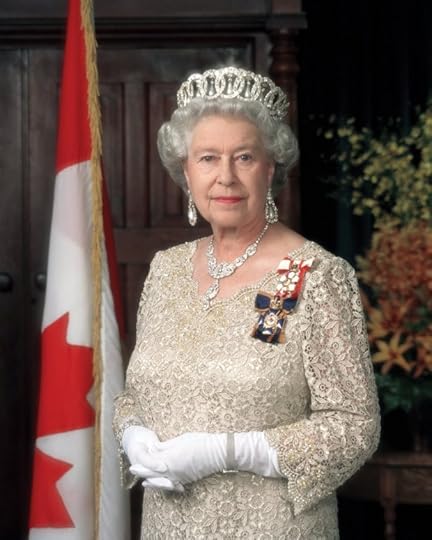
Her Majesty Queen Elizabeth II
Last, but by no means least in my list, is Her Majesty Queen Elizabeth II.
I have twice been fortunate enough to meet and speak to Her Majesty, and on both occasions she left me in awe. That she has so graciously and dutifully served this country for over sixty years, and continues to do so, is both inspiring and humbling. Long may she continue to reign.
That’s about it. My short list and my first- and last-ever post on ‘celebrities’. . . I promise.
Have a good one.

August 29, 2014
On interfering politicians, Daphne du Maurier, and a plea for the humble seagull
Some men are born great, some achieve greatness, and some have greatness thrust upon them. If your name is Malvolio or ‘Teddy’ Roosevelt you can legitimately make such a claim, but what about all those others who go in search of greatness for its own sake?
I have no problem with them. Ambition can be a curse, but it can also offer motivation and inspiration in the pursuit of excellence.
You see, I don’t care how ambitious or star struck or bohemian or avant-garde or downright quirky people might be, just so long as they aren’t interfering with my life or hurting others.
But what, I hear you ask, about those ambitious people who seek to interfere and, in some cases, actually govern our lives?
These people are different. These people are politicians, irrespective of their particular brand of rhetoric or grandiose titles or clawed responsibilities. They are politicians, and would smell the same by any other name. Presidents, ministers, prime or otherwise, secretaries of this, secretaries of that, judges, magistrates, mayors, councillors, committee members, the list goes on ad infinitum and ad nauseum.
The Scottish comedian Billy Connolly, a man not unfamiliar with ambition, once joked that ‘the desire to be a politician should actually bar you from ever becoming one’. I have to agree.

Billy Connolly
While understanding the need for responsible government, I do feel that politicians should be reluctant servants rather than ambitious masters.
With that said, I guess the fact that I have clashed with these people throughout my life will come as no surprise to you.
This was just one of many such occasions.
Now, I have always loved animals. I feel that as, arguably, earth’s most intelligent life form the human race should look after and care for its fellow creatures. I also believe that this responsibility should encompass every creature, from the tiniest insect to the greatest mammal. . .
And that brings me to seagulls.

Daphne du Maurier
I can understand how Daphne du Maurier gained inspiration from Cornwall’s sea birds. They are noisy, quarrelsome, impudent, larcenous, aggressive, and, given half a chance, will crap all over both you and your ice cream.
But, despite all that, or maybe because of all that, I rather like them.
When my wife and I lived in Cornwall, we had a family of seagulls living in our chimney, or to be more precise between the chimney pots. My wife, Pam, christened the mother ‘Jackie’, don’t ask me why, and ‘Jackie’ became a sort of extension to our family; or to be more precise, we became an extension to hers.
Every now and then we would hear a high-pitched squeak coming from the chimney breast, and know that ‘Jackie’ would soon be knocking on the door, because she had another fledgling to feed.
You don’t believe the ‘knocking on the door’ bit? I promise you it’s true. I’d be upstairs, working in my study. Pam would be downstairs, working in hers, and we’d hear it. . . a tap, tap, tapping on the French doors leading to our garden.
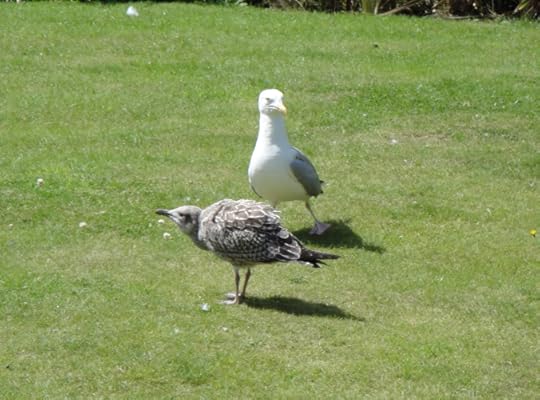
Jackie and Baby
Into the kitchen we’d go, and there would be ‘Jackie’; sitting on the back step, peering through the glass, and waiting for her food. Over the years it became something or a ritual. Just as, a few weeks after that, the appearance of mottled infant with neck not yet fully extended, and proud mother warding off all the other seagulls, would herald a welcome cessation to the tapping.
Which is part of the reason that I became so incensed when I received a letter from Cornwall County Council, ordering me to stop feeding the birds.
In truth there was something of a history to it, because a few years prior to that my neighbour – a man I was never especially enamoured of – extended the spikes he’d installed on his roof, to include the fencing between our two properties.
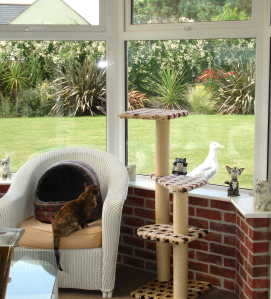
Jackie and Suki
On the roof he’d installed them to impale the webbed feet of seagulls. On the fence he’d installed them with the specific purpose of impaling my Burmese cats.A major row ensued. I threatened to impale a specific aspect of his anatomy with one of his own spikes, and we didn’t speak a civil word to each other from that day forward.
But then, as with so many petty conflicts, the situation worsened.
Apparently my interfering neighbour had decided to escalate our particular Cold War, to open confrontation at the thirty-eighth chestnut paling. To this end he brought in the not inconsiderable interference of Cornwall County Council’s very own Joseph Stalin; to dictate how I, and my extended family, lived our lives.

Joseph Stalin
‘Stalin’ advised me that he had ‘received reports’ of me feeding birds, and in particular feeding seagulls. He went on to say that I should immediately desist, or face the considerable wrath of the elected ‘local authority’, which I assumed to be something akin to the tanks rolling into Prague in 1968.
I wasn’t having that.
I wrote to the council, and explained that I fed all birds, not just seagulls. I pointed out that this included sparrows, robins, thrushes, starlings, jackdaws, crows, pigeons, wrens, swallows, house martins, and even the occasional disoriented pheasant.
I then went on to advise him that I had the United Nations on my side, otherwise known as The Royal Society for the Protection of Birds. I finished my letter by suggesting that, if he knew of a specific law against feeding birds, he should quote chapter and verse of said law, and I would obviously comply.
Having tried and failed with the battering-ram approach, our very own Secretary to the Cornwall County Council Presidium then tried reasoning. He wrote of the very real dangers to life and limb, and enclosed some press clippings of seagulls apparently attacking human beings.
While loving the aforementioned Daphne du Maurier, I did feel that he and the various ‘local rags’ might be confusing fact with fiction. I wrote and explained that, if idiot tourists waved their Cornish Pasties around like bait in a trap they shouldn’t be entirely surprised if hungry birds tried to steal them.
I then went on to ask the sixty-four-thousand-dollar question. . . Which is the more aggressive, a hungry creature or a well-fed creature?
I didn’t hear any more for another eighteen months, but then received a second missive from another of Stalin’s Presidium protégés, ordering me to stop feeding the seagulls; it was almost like ‘Groundgull Day’.
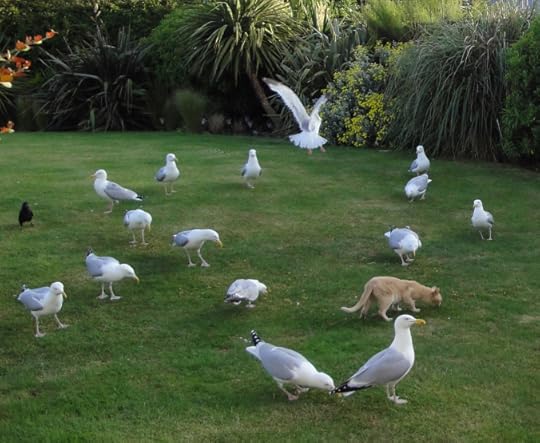
Feeding Time
I referred him to my earlier correspondence with the council, and heard nothing more.
And that was where we concluded matters; a sort of Cold War stand-off, Cornish style.
As with the cessation to hostilities in Korea, our cessation to hostilities was never formally negotiated. My neighbour and I still glared at each other across the spike-encrusted thirty-eighth paling, and the council presumably sat seething in their Kremlin chambers; no doubt awaiting a time when they could bring in some sort of legally-enforceable bye-law to prevent anyone flouting their authority and feeding birds.
For her part ‘Jackie’ showed no sign of moderating her procreational activities, and continued to tap on the door at shamelessly-regular intervals.
Now that I no longer live in Cornwall, I do miss Jackie and her broods, and I often wonder whether or not she still taps on the door of my old house.
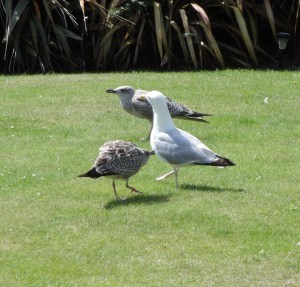
Jackie and Family
I also wonder whether or not the new owners continue to feed her, as we did, or if they lie awake at night dreaming Daphne du Maurier and Alfred Hitchcock inspired nightmares, of the sinister Bodega Bay and a wild-eyed Tippi Hedren.
I do hope, for both Jackie and their sakes, that it’s the former.
Have a good one

August 22, 2014
On favourite places, and the threshold guardians who keep them that way
When Joseph Campbell first wrote of The Threshold Guardian, he wrote of a guardian to what he called The Zone of Magnified Power; an obstacle to the hero’s progress. Campbell wrote of an obstacle that tests the hero, and one that, if overcome, can provide both knowledge and increased power to the triumphant hero on his or her journey to the elixir.

The Writer’s Journey
In his book The Writer’s Journey, Christopher Vogler provides a more down-to-earth interpretation of Campbell’s work and identifies many feature film characters who conform to the archetype. Each can vary enormously in power and stature. The villain’s humble bodyguard in an Ian Fleming yarn first tries to eliminate the hero, James Bond. It is only when he fails, and instead stands staring apprehensively at the barrel of Bond’s Walther PPK that he says. . . “Don’t kill me, Mister Bond, and I will tell you where Blofeld is hiding”.
Then we meet more benign Guardians who may wield more power, but offer lesser power magnification. ‘M’, who tells Bond to achieve the seemingly impossible, and save the world from certain destruction without upsetting the establishment, is a form of Threshold Guardian, but is also a powerful ally . In my own novel The Folks at Fifty-Eight we meet the sombre and pretentious Daniel Chambers, a Threshold Guardian who places all manner of obstacle in the path of the hero Hammond.
Outside of novels and cinema screens, we meet many of these people in the course of our daily lives, but seldom recognise them as such, and often consider them villains. The bureaucrat who insists on an orgy of form filling, before he or she will consider progressing your application. The pharmacy assistant, who insists you answer a series of inane questions, prior to dispensing an over-the-counter remedy. The committee member who blocks your membership of the sports club. The interviewer who turns down your application for that dream job. The slush-pile reader who rejected your cherished book proposal.
It is only by learning to negotiate these ‘obstacle placers’ that we are able to progress and enrich our daily lives.
However, not all are necessarily forces for evil or negativity. Occasionally we meet Threshold Guardians who may at first seem to be hindering our progress, but in truth are simply maintaining standards and culture.
How many times have we returned to a favourite place, some years after our initial visit, only to find that it has altered out of all recognition. Rarely is this metamorphosis for the better. It may have succumbed to the demands of commercial enterprise, or criminal activity, or become so popular that its original charm has been lost. It may simply have become worn out, or run down, or been modernised into blandness.
I can think of many such places from my childhood.

Benidorm
Benidorm, a once quaint fishing village, on Spain’s Costa Blanca, is now a nightmare hotchpotch of high-rise hotels and apartment blocks. Streets that once charmed visitors, with all that was wonderful about ‘the essential Spain’ are now awash with ‘all-day breakfast bars and drunken British tourists. Puerto Banus, on Spain’s Costa del Sol, appears to be on the same tragic path to crassness, and is in imminent danger of becoming a garish monument to all that unfettered greed, organised crime, and corporate commercialism brings.
In France, on the hugely expensive Cote d’Azure, we see other examples; the brash commercialism of Nice and its famous Promenade des Anglais, sitting just a few kilometres along the coast from the quainter and more-appealing Croisette in Cannes.

Cannes
Britain is not immune to the perils of commercialism and greed. As a lover of golf I have watched what I consider to be the decline of one of Britain’s greatest golf clubs. The beautiful and world famous Wentworth Club has improved its facilities, but somehow lost its uniqueness in succumbing to the dictates of commercialism, while a couple of miles away, the equally beautiful and famous Sunningdale Golf Club has retained its charm, defended its honour, and kept its soul.

Sunningdale Golf Club
Some will disagree with me. They will claim that Nice is more fun, or that Marbella is now less stuffy and more affordable, but I know which I prefer. Many will claim that Wentworth is more famous and more prestigious than Sunningdale, with finer facilities, a tougher test of golf, and a more welcoming atmosphere. They are entitled to their opinions, but I know where I would sooner be a member.
Some of this degeneration can be attributed to the cruel gods of progress and modernisation. Some can be attributed to growth of population, and the ravages of time, but whenever we return to a favourite haunt, and find it transformed into ugliness, we will usually find the absence of strong Threshold Guardians.
And, just as I highlighted in the previous paragraphs on the archetypal Threshold Guardians of novels and feature films, these powerful and influential characters, who protect our heritage and thwart this so-called progress, come in many shapes and guises.

Marbella
On Spain’s Costa del Sol it was a man called Jesus Gil, who took time off from being the archetypal ‘villainous mayor’, to ensure both the safety of local residents and the cultural heritage of Marbella. Some refer to him as a Mafioso-style crook, who got but never served the prison sentence that he was undoubtedly due. Others remember him as the man who made Marbella safe for families to enjoy, without the unwanted attention of those drug pushers, prostitutes, petty criminals, and sleazy bar owners who are once again beginning to infest and infect the lovely Puerto Banus.

Jesus Gil and Friends
Jesus Gil. An archetypal villain? Perhaps, but without doubt a Threshold Guardian of the finest kind.
In the more tranquil and rarefied atmosphere of the Surrey countryside, Sunningdale Golf Club also has its Threshold Guardians. The committee at Sunningdale may be considered privileged and pretentious by many, and may or may not warrant that description, but those of us who fondly remember Sunningdale and Wentworth clubs, in days gone by, and who love the history and heritage of the game, are grateful for them.

Wentworth Club
And so next time you are thwarted by a Threshold Guardian, just remember that not all are forces for evil, and many are indeed forces for good. Think back to the places you loved as a child, remember how change is not always to be admired, and then think kind thoughts of those who seek to guard and protect.
Have a good one.

August 12, 2014
Happiness
On what makes us happy.
I watched Breakfast TV today.
The presenter voiced one of those searching questions. It was not one of those questions where the station receives ten thousand answers, cherry-picks three or four that legitimize the desired point of view, and then claims overwhelming public support for an opinion the station held, but didn’t have the guts or legal approval to give.
This was a good question; a question that I partially addressed in Flying with Cuckoos.
It asked, what makes people truly happy?
Ask people what makes them happy, and you will get a wide variety of answers: love, money, fame, success at work, a solid relationship, a good book, a walk in the countryside, a beautiful girlfriend, a good-looking boyfriend, a fast car, a designer handbag. All these, and an infinite number of other answers, will inevitably spew forth. But are these true happiness factors, or merely reflections of circumstance?
You see, I believe lasting happiness is nothing to do with any of that. I believe that lasting happiness is all to do with contentment, and contentment is often to do with being realistic.
You don’t agree? Well, O.K. then, remember the little fat boy at school, the lonely one with the McDonalds’ quantity discount card and raging acne; the one everybody sniggered at and did their utmost to avoid. When he was at school, longingly admiring some precocious Lolita with long blonde hair, piercing blue eyes, and a proud rear end, he couldn’t have been more miserable. He would have secretly both adored and hated her and all of her fickle and vindictive friends when they scoffed at his tubby unattractiveness and laughed at his clumsy infatuation.

He would have failed just as miserably on the football field, or the athletics track, or in the gymnasium, and he would have both envied and hated the other boys for their superior abilities and cruel contempt for his pitiable athleticism. And, as he trudged home at the end of each long and painful day, he would have hated himself for his perception of failing in that which truly matters to athletic young studs and precocious Lolitas alike.
But then, look again at that same little fat boy, years later, when realism’s harsh and invaluable lessons have been learnt. No more does he dream of precocious Lolitas. He may glance and imagine, because that is part of mankind’s fun in living, but the pain of unrealised desire has gone. You see, he gained reality. He married unfancied Penelope, from the cooked meats counter at the local supermarket, and he achieved peace of mind.
Now he has a loving wife, a devoted mother, and a caring family to return to each night, and although being married to unfancied Penelope may not in itself generate envy, over the months and years he has come to understand that the admiration and envy of other men is not always in itself to be envied.
Nor does he any longer attempt to compete in the sporting arena, because he now sees such competition for what it truly is; a momentary entertainment for the masses, and a failure waiting to happen for the fleetingly-triumphant gladiators.
And so, instead of heading off in search of fickle triumph, he hurries home to the ample bosom of a loving family; therein discovering his true self, and lasting contentment.
You see, our little fat boy has achieved something special since those lonely days at school. He stopped grasping for the unobtainable, replaced envy’s malcontent with realism’s peace of mind, and discovered lasting happiness.
Anyway, that’s about it for this post. . . I’m off to see how far my books have climbed on Amazon’s best-seller listings.

August 10, 2014
On the need for tenacity
As writers we have to be tenacious, and I had always thought of myself as that. For months on end I research and learn and file, and research and learn and file. Then I sit at my keyboard and slog away at the manuscript, for many more months. After that I edit and re-edit and edit again, until it all becomes a blur. Then I market and promote and re-market and further promote.
The whole process can, and in my case does, take years, with no guarantee of success or income at the end of it, and such a labour requires a fair degree of tenacity.
I had it in spades, or so I thought, but then, a couple of years ago, I met the real deal.
He was a surly character, taciturn and uncommunicative. He arrived unannounced one night, and proceeded to dig a hole underneath my newly erected and hugely expensive garden fencing.
With that single act of mindless vandalism he began a battle of wits and attrition that continued for the next six months.
We weren’t on speaking terms at the time, and so I never did discover his name. I simply referred to him as ‘that F*****g animal’ and then, much later, when my newly-turfed lawn was littered with a criss-cross of tracks and scrapes and holes, I simply called him ‘The Badger’.
His means of ingress I never discovered, but his means of egress was patently clear. . . It was that newly-dug hole under my brand-new fencing.
‘Right,’ I thought, ‘two can play at that game’.
And so I took a spade and set about the mound of earth that was now suffocating my newly-planted herbaceous border. I carefully and painstakingly uncovered the plants, brushed off the leaves, and then refilled the hole. With repair thus made, I selected a few stones and slates, scattered them over the repair, and retired for a well-earned glass of wine.
The next morning both hole and mound of earth were back, if anything slightly larger, and battle was joined.
For the next three months I filled that hole with earth, I filled that hole with pebbles, I filled that hole with rocks, and I filled that hole with slate. The result was the same in every case: Badger 1, MPC 0.
The herbaceous border had long since given up the ghost when I decided to seek advice from some of the locals down at the village pub.
‘There’s only one way to get rid of a badger.’ They said. ‘You take a bucket, fill it with urine, and place it by the hole. . . he won’t come back.’
‘Neither would I.’
I warily studied them, not sure if they were joking at my expense (you will undoubtedly have used your own expression). It seemed they weren’t.
So that was it. I could either turn my fragrant English country garden into something akin to an inner-city public lavatory, or capitulate to a dumb omnivore. There had to be another way.
For the next two months I persevered with the rocks and stones, and for the next two months that damned animal thwarted my every effort. . . but then a brainwave.
‘Cement! I’ll fill it with cement’.
And so off I went to the DIY store; returning with a large bag of cement and a large bag of sand, which I then mixed into concrete before filling the hole. The result was proudly shown to my unconvinced wife, as I smiled a smile of knowing superiority and said. . . ‘Let’s see him dig through that.’
He didn’t. In fact, the lump of cement is still there now. I can’t get it out.
Unfortunately, so is the hole that he then dug, three yards farther away, behind one of my prize conifers. The same hole that my wife took tremendous delight in pointing out to me a few days later.
You may wonder if winter, and hibernation, brought some respite. . . it didn’t, and he doesn’t.
Today the badger and I are still not on speaking terms, although we have come to a mutually acceptable arrangement. . . He goes wherever he wishes, and does whatever he pleases, and I try not to notice.
Perhaps, when it comes to persistence and tenacity, that’s why people use the term ‘to badger’ rather than ‘ to author’.
Have a good one.


![Pageflex Persona [document: PRS0000040_00022]](https://i.gr-assets.com/images/S/compressed.photo.goodreads.com/hostedimages/1430894329i/14776128._SY540_.jpg)



![Pageflex Persona [document: PRS0000040_00022]](https://i.gr-assets.com/images/S/compressed.photo.goodreads.com/hostedimages/1414945617i/11708012._SY540_.jpg)

![Pageflex Persona [document: PRS0000040_00022]](https://i.gr-assets.com/images/S/compressed.photo.goodreads.com/hostedimages/1414801398i/11695093._SY540_.jpg)

![Pageflex Persona [document: PRS0000040_00022]](https://i.gr-assets.com/images/S/compressed.photo.goodreads.com/hostedimages/1412261916i/11347187._SY540_.jpg)




